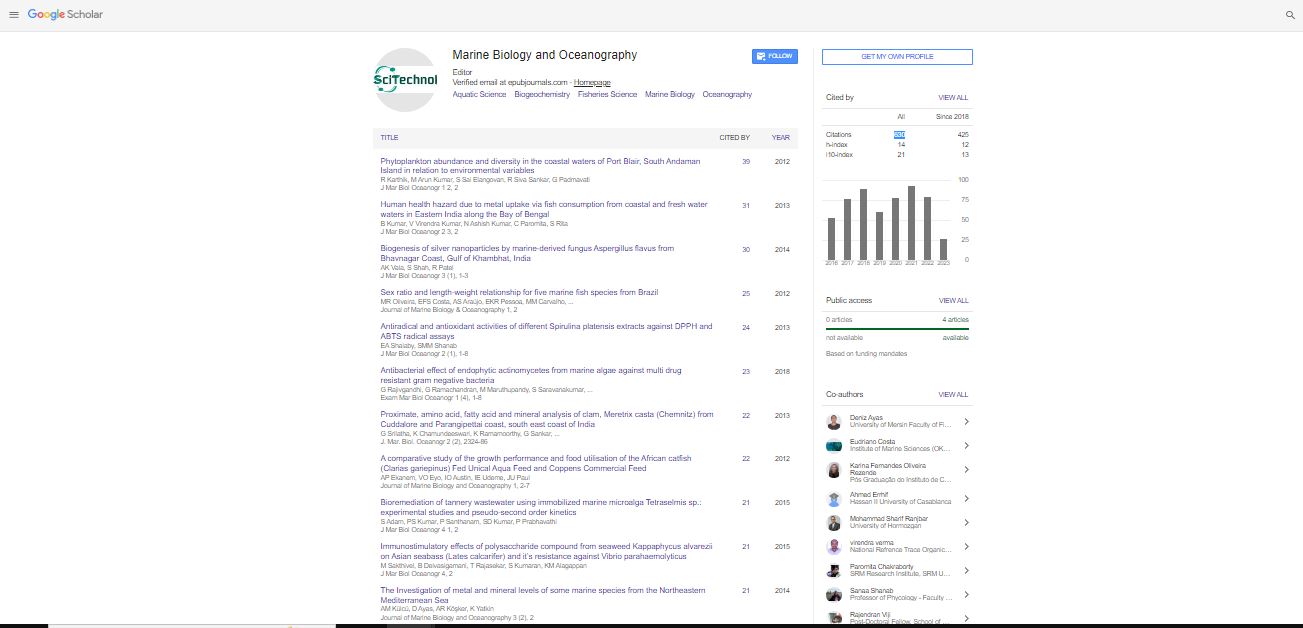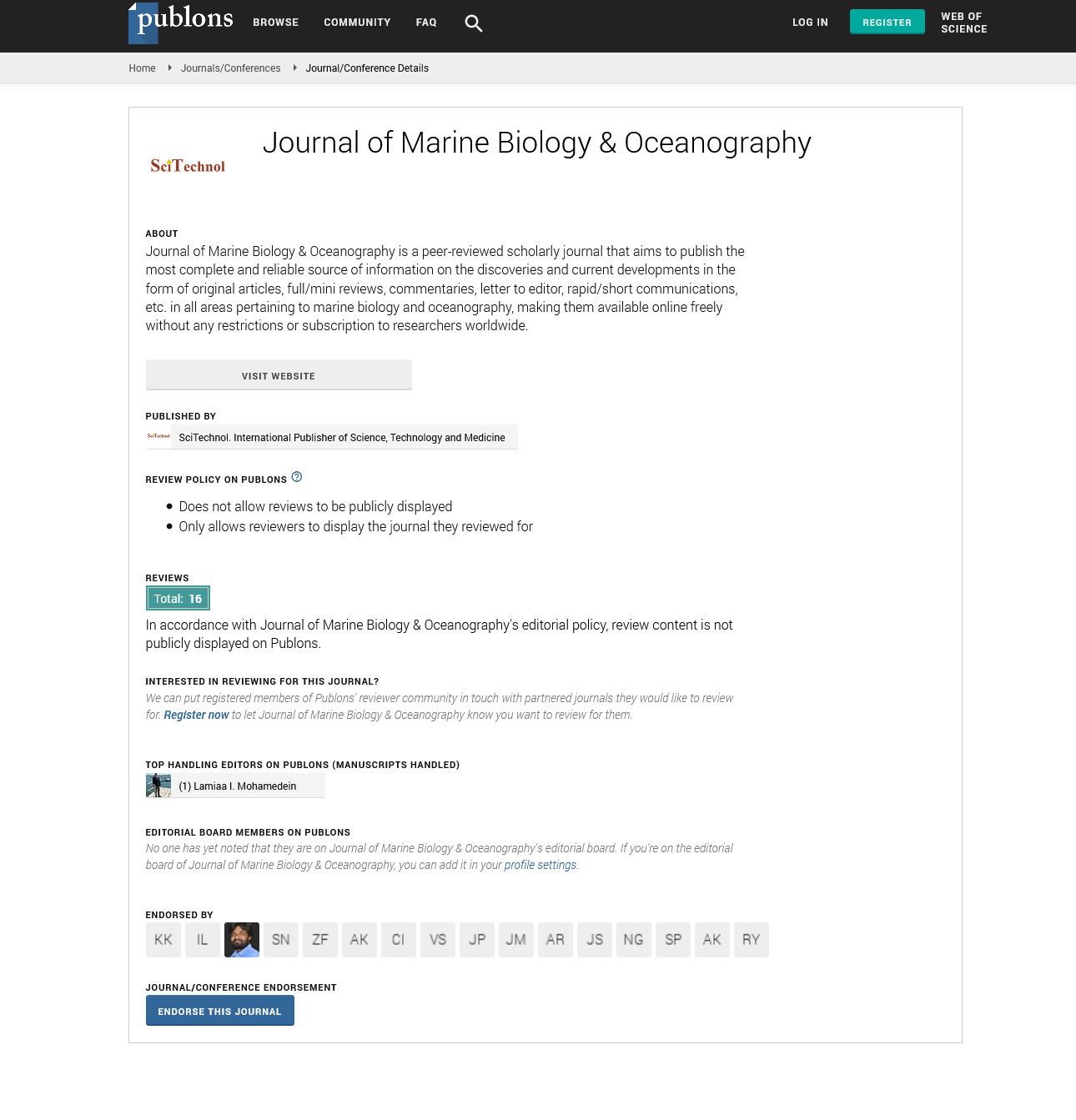Commentary, J Mar Biol Oceanogr Vol: 12 Issue: 3
Evaluating the Methods of Marine Pollution and its Impact on Human Well-being
Joan Arifin*
1Department of Functional Biology, University of Oviedo, Oviedo, Spain
*Corresponding Author: Joan Arifin,
Department of Functional Biology, University
of Oviedo, Oviedo, Spain
E-mail: joan_arifin@uo22.es
Received date: 22 May, 2023, Manuscript No. JMBO-23-105100;
Editor assigned date: 25 May, 2023, PreQC No. JMBO-23-105100 (PQ);
Reviewed date: 08 June, 2023, QC No. JMBO-23-105100;
Revised date: 15 June, 2023, Manuscript No. JMBO-23-105100 (R);
Published date: 22 June, 2023, DOI: 10.4172/2324-8661.1000274.
Citation: Arifin J (2023) Evaluating the Methods of Marine Pollution and its Impact on Human Well-being. J Mar Biol Oceanogr 12:3.
Description
Marine pollution poses a significant threat to the health of the oceans and, consequently, to human well-being. With increasing industrialization and human activities, various methods of marine pollution have emerged, resulting in detrimental effects on both marine ecosystems and human populations. Chemical pollution in the marine environment occurs through the discharge of industrial and domestic waste, agricultural runoff, and accidental spills. Toxic substances such as heavy metals, pesticides, and oil can contaminate the water, accumulating in the tissues of marine organisms. Consuming contaminated seafood can lead to adverse health effects in humans, including neurological disorders, organ damage, and an increased risk of cancer.
Oil spills, either from tanker accidents or offshore drilling activities, have devastating consequences for marine ecosystems and human health. Oil coats the feathers of marine birds, inhibiting their ability to fly, and impairs the functioning of the respiratory and reproductive systems of marine mammals. When humans come into contact with oil-contaminated water or consume contaminated seafood, it can lead to skin irritations, respiratory problems, and gastrointestinal issues.
The accumulation of plastic debris in the ocean is a growing concern. Plastics break down into micro plastics, which are small particles that are ingested by marine organisms. These micro plastics can enter the human food chain when seafood is consumed. Ingesting micro plastics has been linked to various health issues, including hormonal disruption, immune system suppression, and digestive disorders. Excessive discharge of nutrients, such as nitrogen and phosphorus, into the ocean leads to nutrient pollution. This often occurs due to agricultural runoff and untreated sewage. The excess nutrients promote the growth of harmful algal blooms, which produce toxins that can accumulate in shellfish and fish. When consumed by humans, this contaminated seafood can cause illnesses, including gastrointestinal problems and neurological disorders.
Underwater noise pollution, primarily from shipping activities, sonar systems, and seismic surveys, disrupts the communication and behavior of marine species. This can lead to stress, hearing damage, and displacement in marine mammals, affecting their overall wellbeing. Additionally, noise pollution can impact human well-being, as exposure to constant underwater noise has been linked to increased stress levels and adverse health effects.
Untreated or poorly treated sewage and wastewater discharge can introduce harmful pathogens and contaminants into marine environments. This can result in the contamination of shellfishgrowing areas and recreational waters, increasing the risk of waterborne diseases in humans. Ingestion or contact with contaminated water can cause gastrointestinal infections, skin irritations, and respiratory illnesses.
Increasing carbon dioxide emissions from human activities lead to ocean acidification, which alters the pH of seawater. This can have detrimental effects on marine organisms, particularly those with calcium carbonate shells or structures. Impacts on shellfish, coral reefs, and other marine organisms can disrupt the food web and ecosystem balance. These changes can have far-reaching consequences for human populations that rely on seafood as a vital source of nutrition and livelihood.
Conclusion
The methods of marine pollution pose significant risks to marine ecosystems and human well-being. Chemical pollution, oil spills, plastics and micro plastics, nutrient pollution, noise pollution, sewage discharge, and the impacts of acidification and climate change all contribute to the degradation of marine environments and the potential health risks for humans. Addressing marine pollution requires a multifaceted approach, including stricter regulations, sustainable practices, waste management strategies, and public awareness. By taking action to reduce marine pollution, one can protect the health of the oceans and safeguard human well-being for future generations.
 Spanish
Spanish  Chinese
Chinese  Russian
Russian  German
German  French
French  Japanese
Japanese  Portuguese
Portuguese  Hindi
Hindi 
